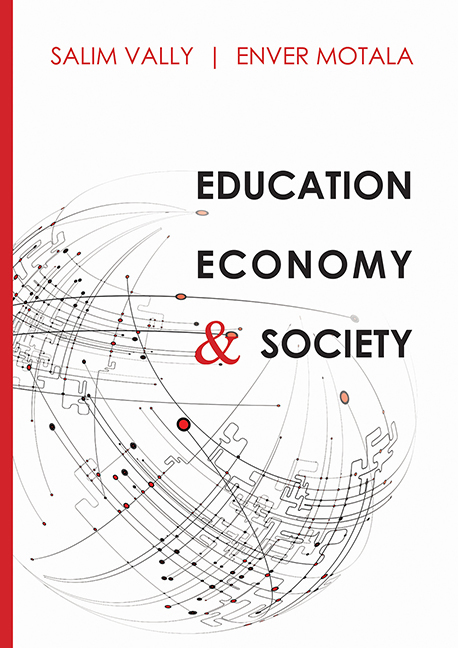Book contents
- Frontmatter
- Contents
- Foreword
- Preface
- About the contributors
- Acknowledgements
- Abbreviations and acronyms
- Chapter 1 ‘NO ONE TO BLAME BUT THEMSELVES’: Rethinking the Relationship between Education, Skills and Employment
- Chapter 2 EDUCATION AND ECONOMY: Demystifying the Skills Discourse
- Chapter 3 UNIVERSITIES AND THE ‘KNOWLEDGE ECONOMY’
- Chapter 4 GOING AROUND IN CIRCLES: Employability, Responsiveness, and the Reform of the College Sector
- Chapter 5 BUILDING A TRANSFORMATIVE PEDAGOGY in Vocational Education
- Chapter 6 SKILLS? WHAT SKILLS? JOBS? WHAT JOBS? An Overview of Research into Education/Labour Market Relationships
- Chapter 7 DEBATING THE NEXUS of Education, Skills and Technology in the Age of Lean Production: A Case Study of the ArcelorMittal Vanderbijlpark Plant
- Chapter 8 SKILLS, JOBS AND DECEPTION: Examples from the South African Workplace
- Chapter 9 ON THE USE AND ABUSE OF EDUCATION: Reflections on Unemployment, the ‘Skills Gap’ and ‘Zombie Economics’
- Chapter 10 THE YOUTH WAGE SUBSIDY in South Africa: Employment, Skills and ‘Churning’
- Chapter 11 EPISTEMIC INJUSTICE and the Struggle for Recognition: Human Dignity and the Recognition of Prior Learning
- Chapter 12 (RE)CLAIMING WORKERS' EDUCATION
- Chapter 13 SKILLS DEVELOPMENT in Post-Apartheid South Africa: Issues, Arguments and Contestations
- Index
Chapter 1 - ‘NO ONE TO BLAME BUT THEMSELVES’: Rethinking the Relationship between Education, Skills and Employment
Published online by Cambridge University Press: 16 February 2020
- Frontmatter
- Contents
- Foreword
- Preface
- About the contributors
- Acknowledgements
- Abbreviations and acronyms
- Chapter 1 ‘NO ONE TO BLAME BUT THEMSELVES’: Rethinking the Relationship between Education, Skills and Employment
- Chapter 2 EDUCATION AND ECONOMY: Demystifying the Skills Discourse
- Chapter 3 UNIVERSITIES AND THE ‘KNOWLEDGE ECONOMY’
- Chapter 4 GOING AROUND IN CIRCLES: Employability, Responsiveness, and the Reform of the College Sector
- Chapter 5 BUILDING A TRANSFORMATIVE PEDAGOGY in Vocational Education
- Chapter 6 SKILLS? WHAT SKILLS? JOBS? WHAT JOBS? An Overview of Research into Education/Labour Market Relationships
- Chapter 7 DEBATING THE NEXUS of Education, Skills and Technology in the Age of Lean Production: A Case Study of the ArcelorMittal Vanderbijlpark Plant
- Chapter 8 SKILLS, JOBS AND DECEPTION: Examples from the South African Workplace
- Chapter 9 ON THE USE AND ABUSE OF EDUCATION: Reflections on Unemployment, the ‘Skills Gap’ and ‘Zombie Economics’
- Chapter 10 THE YOUTH WAGE SUBSIDY in South Africa: Employment, Skills and ‘Churning’
- Chapter 11 EPISTEMIC INJUSTICE and the Struggle for Recognition: Human Dignity and the Recognition of Prior Learning
- Chapter 12 (RE)CLAIMING WORKERS' EDUCATION
- Chapter 13 SKILLS DEVELOPMENT in Post-Apartheid South Africa: Issues, Arguments and Contestations
- Index
Summary
Once you are on that road [to ‘human capital’ theory] – and most capitalist business ideologues are on that road – it is very easy to fall into the kind of discourse where one or another group of people is considered to be ‘superfluous’, ‘over-concentrated’, etc. The Hitlers and the Fronemans of the world eventually forced these people into railway trucks or lorries and transported them to their death in the gas chambers, or to their last graves in the many Dimbazas of our beloved country … Once the commodity value of people displaces their intrinsic human worth or dignity, we are well on the way to a state of barbarism. Unless and until we bring back into our paradigms, and thus into our social analyses, the entire human being and the ways in which human beings can live fulfilled lives beyond their mere economic needs, we will continue to promote anti-human philosophies and policies that ultimately tend to work to the benefit of those who have, and to the detriment of those who do not.
— Neville Alexander, 2012Introduction
Accepting the link between education and training and the economy, and the idea that education has a defining role in promoting individual economic capability and national economic performance, requires critical reflection. All too often the relationship between education and the economy is understood through the crude and uninformed formulations of many political and business leaders, ‘expert’ commentators, economists and even some higher education leaders, academic analysts and reviewers. Even a casual reading of the print media or a listen-in to the many ‘chat’ and current affairs shows on the subject, will show how unrestrained the power of the prevailing dominant approach to skills and knowledge development has become. The nation, and regrettably even organisations that seek to represent the interests of the poor and working class, are now hostage to a particular way of thinking about education and the economy and are largely paralysed by it.
- Type
- Chapter
- Information
- Education, Economy & Society , pp. 1 - 25Publisher: University of South AfricaPrint publication year: 2014

